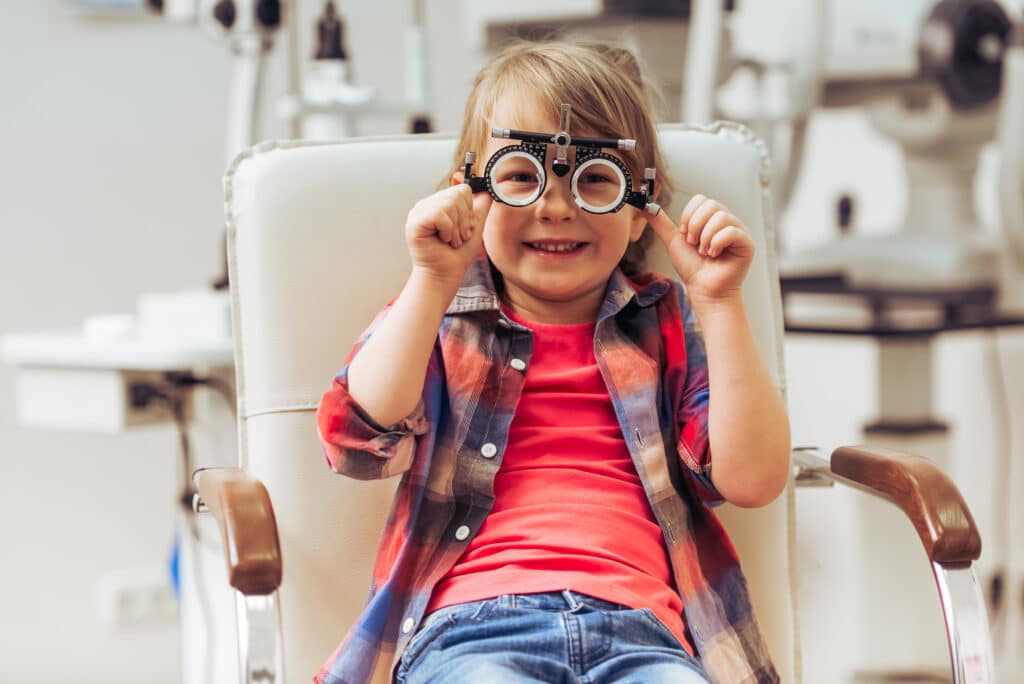Pediatric Eye Care

It’s one thing to understand eyes inside and out and to skillfully diagnose and appropriately treat eye disorders or diseases. It’s something quite different to understand from a child’s perspective how vision problems can affect the ability to run, play and read. So beyond the eyes, we also work to understand the heart that pushes and the mind that motivates; to find what really makes the child tick, to see how helping eyes will help all that, too.
At Associated Eye Care, our pediatric specialists, Dr. Kelsey Engelbart, Dr. Ann Hickson, Dr. Jeffrey Lynch and Dr. Susan Schloff have devoted their professional careers to caring for children. They understand how to overcome a child’s fear of “going to the doctor,” take the time to ask questions and really listen so they can provide the best treatment.
Important Links
Our providers also understand the importance of catching vision problems early, before they begin to affect schoolwork and other activities. Our pediatric doctors understand how precious a child’s sight is and are committed to providing the very best care.
Special Tips for Infants & Toddlers
What to Expect at the Pediatric Ophthalmologist
How to Administer Eye Drops
to Children
Most Common Pediatric Conditions
Amblyopia, also known as “lazy eye” is poor vision due to lack of normal development of sight. It is a very common condition, affecting 2-3 of every 100 people. Normally, children’s eyes continue to develop from birth until age 9 or 10. Amblyopia is caused by conditions that interfere with that normal development.
There are three major causes of amblyopia:
1. Unequal focus. In the healthy eye, equal focusing problems can be corrected with glasses. If there is unequal focus because one eye is more nearsighted, farsighted, or has astigmatism, amblyopia may occur. In these cases, the out of focus or blurry eye “turns off” and becomes amblyopic. The brain ignores that blurry eye, and it develops poor vision. This type of amblyopia is very difficult to detect, because the eyes look normal.
2. Strabismus or misaligned eyes can cause amblyopia when the brain ignores the crossed eye to avoid seeing double. The straight eye usually retains normal vision. Some children may have a large amount of crossing, which is easy to detect. Others have a very tiny amount, which can be difficult to see at home, but can still cause amblyopia.
3. Cloudiness of the normally clear parts of the eye can prevent a sharp image from reaching the inside of the eye. One example of this is a cataract, or cloudiness of the lens of the eye. Although far less common in children than in the elderly, cataracts can occur in young children.
Amblyopia is diagnosed by finding a difference in the vision of the two eyes. A vision screening exam will help detect this, though further diagnosis and treatment will need to take place with a pediatric provider. A pediatric provider will help determine which of the three causes of amblyopia are occurring in your child. Sometimes, more than one can exist at the same time. During that visit, the entire eye will be carefully examined to check for other causes of poor vision.
Treatment of amblyopia involves using the weak eye. Covering or patching the stronger eye accomplishes this by making the weaker eye work alone. Glasses may also be prescribed to correct the unequal focus. Patching often needs to be done while wearing glasses full time in order to completely treat amblyopia. If surgery is required for straightening the misaligned eyes, patching or glasses may continue afterward. All forms of treatment need to be started as soon as possible. Amblyopia can become permanent if not treated at an early age.
Strabismus is a condition that causes the eyes to misalign. The eyes of strabismus patients may turn in, out, up or down, and one or both eyes may be affected. This can cause problems with depth perception. Strabismus may stem from a disorder affecting the brain’s ability to coordinate the eyes, but it is more frequently caused by one or more muscles that do not function correctly.
According to strabismus.org, as many as one in twenty children may be affected by some degree of strabismus, though the level of severity can vary significantly. In certain cases, surgery can correct this condition.
Constant Strabismus
In this condition, the affected eye or eyes is always turned up, down, in or out.
Intermittent Strabismus
In this condition, the affected eye or eyes is only turned up, down, in or out some of the time, often during illness or times of stress. Regardless of the type of strabismus that affects your child, proper diagnosis and treatment is essential. Children will not outgrow this condition. Associated Eye Care’s pediatric ophthalmologists, Drs. Susan Schloff and Jeffrey Lynch perform corrective surgery for strabismus when necessary.
Adult Strabismus (With or Without Double Vision)
Adults may have acute or longstanding strabismus. In some cases the patient experiences double vision (sees two of the same thing). Often there are treatments available to make like more comfortable or to restore the alignment of the patient’s eyes. Treatments may include glasses, prisms, eye exercises or surgery.
“Lazy Eye” is a blanket term that can mean one of a few things; first, one eye may see worse than the other (amblyopia). Second, one eye may be misaligned (strabismus). Finally, one eye may have poor vision and may be misaligned.
Often, children and adults diagnosed with certain syndromes are at higher risk for ocular conditions. The providers and staff at Associated Eye Care have decades of experience caring for patients with special needs. We try our best to put your child at ease during the exam, while gathering the highest quality of information to develop the best treatment plan for your child.
Chronic tearing or overflow tearing is a common condition in infants. Up to one-third of all newborns have excessive mucus and tears in their eyes. Chronic tearing happens when a blockage exists in the tear duct, typically a membrane that doesn’t open up naturally as it should. This blockage prevents tears from leaving the eyes. As new tears enter the eyes, overflowing occurs. That often means your child has tears consistently running onto their cheeks.
How Do You Treat Overflowing Tearing?
In most cases, blocked tear ducts open naturally within six to twelve months after birth. But, if overflowing persists beyond that time, treatment may be necessary.
You can do things at home to help open the tear duct. At home, you can:
If none of that works, an outpatient medical procedure may be necessary.
When recommended, this simple procedure involves your eye doctor passing a thin metal probe through your child’s natural drainage pathway, gently pressing through any areas of resistance. Then, they flush the system with fluid to ensure it is open. Anesthesia during the procedure is administered to ensure your child does not feel any discomfort and allow the doctor to use the probing instruments with precision.
Are your infant’s eyes chronically overflowing? Request an appointment at Associated Eye Care.
Over 5% of infants have symptoms of nasolacrimal duct obstruction affecting one or both eyes (AAPOS, 2016). When the small duct between the lower eye lid and the nasal passages is blocked, tears back up and overflow onto the child’s cheek. Sometimes, the blocked tear duct can also cause discharge. Over 90% clear spontaneously during the first year of life (AAPOS, 2016). However, if the condition doesn’t spontaneously clear, consulting with a Pediatric Ophthalmologist is recommended.
Children and adults who experience concussion may have symptoms of eye fatigue or blurred vision. Several of the pediatric providers at Associated Eye Care are prepared to help diagnose and treat these ocular symptoms.
Myopia, or nearsightedness, is when you can see things clearly up close (like reading a book or using your phone), but faraway things (like the chalkboard in school) appear blurry. It’s like when a camera focuses well on close objects but struggles with far objects.




